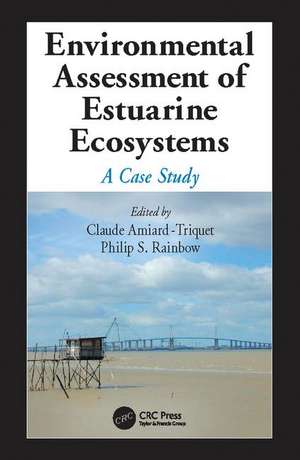Environmental Assessment of Estuarine Ecosystems: A Case Study: Environmental and Ecological Risk Assessment
Editat de Claude Amiard-Triquet, Philip S. Rainbowen Limba Engleză Paperback – 13 iun 2017
Environmental Assessment of Estuarine Ecosystems: A Case Study describes a comparative, multidisciplinary ecotoxicological study of two contrasting estuaries in France. Based on the results of this study, the book presents generalizations about how different techniques might be applied and interpreted in future, similar studies assessing the ecotoxicological status of these vital coastal systems. With contributions from international experts, this reference covers all aspects of estuaries from the physiological to the economical. It introduces the state-of-the-art science required to investigate ecotoxicological problems in many estuaries all over the world.
Although carefully focused on a specific region, this book covers a broad range of environmental issues and solutions, demonstrating how various pieces of information can be integrated into a sound assessment. Understanding the observations about this region and the techniques used for its assessment provide a benchmark for assessing, remediating, and applying new developments to other estuaries.
Preț: 427.84 lei
Preț vechi: 590.27 lei
-28% Nou
Puncte Express: 642
Preț estimativ în valută:
81.87€ • 89.21$ • 68.98£
81.87€ • 89.21$ • 68.98£
Carte tipărită la comandă
Livrare economică 23 aprilie-07 mai
Preluare comenzi: 021 569.72.76
Specificații
ISBN-13: 9781138112223
ISBN-10: 1138112224
Pagini: 368
Ilustrații: 80
Dimensiuni: 156 x 234 mm
Greutate: 0.45 kg
Ediția:1
Editura: CRC Press
Colecția CRC Press
Seria Environmental and Ecological Risk Assessment
ISBN-10: 1138112224
Pagini: 368
Ilustrații: 80
Dimensiuni: 156 x 234 mm
Greutate: 0.45 kg
Ediția:1
Editura: CRC Press
Colecția CRC Press
Seria Environmental and Ecological Risk Assessment
Public țintă
ProfessionalCuprins
Introduction. Sedimentary Processes on Estuarine Mudflats: The Example of the Seine and the Authie Estuaries. Quantification of Contaminants. Biomarkers Based upon Biochemical Responses. Biogeochemistry of Metals in Sediments: Development of "Micro-Scale" Analytical Tools and the Use of Indicators of Biological Activities. Organic Contaminants in Coastal and Estuarine Foodwebs. Tolerance in Organisms Chronically Exposed to Estuarine Pollution. Linking Energy Metabolism, Reproduction, Abundance and Structure of Nereis diversicolor Populations. Historical Records of the Nereis diversicolor Population in the Seine Estuary. Ecological Status and Health of the Planktonic Copepod Eurytemora affinis in the Seine Estuary. From Pollution to Altered Fish Physiological Performance; The Case of Flatfish in the Seine Estuary. Diatoms. Foraminifera. Patterns of Abundance, Diversity and Genus Assemblage Structure of Meiofaunal Nematodes in the Seine (Pont de Normandie) and Authie (Authie Port) Estuaries. Dynamic Diagenetic Modelling and the Impact of Biota. Conclusions.
Notă biografică
Claude Amiard-Triquet, Philip S. Rainbow
Descriere
With contributions from international experts, this reference covers all aspects of estuaries including physiologic and economic factors. Using a comparative case study of two French estuaries, the text demonstrates the state-of-the-art science required to assess the estuary paradox. The two estuaries detailed here provide a full-spectrum analysis of chemical and toxicological exposure and effects. Although the focus is on a specific region, the book covers a broad range of environmental issues and solutions and serves as a benchmark for assessing, remediating, and applying new developments to other estuaries.



